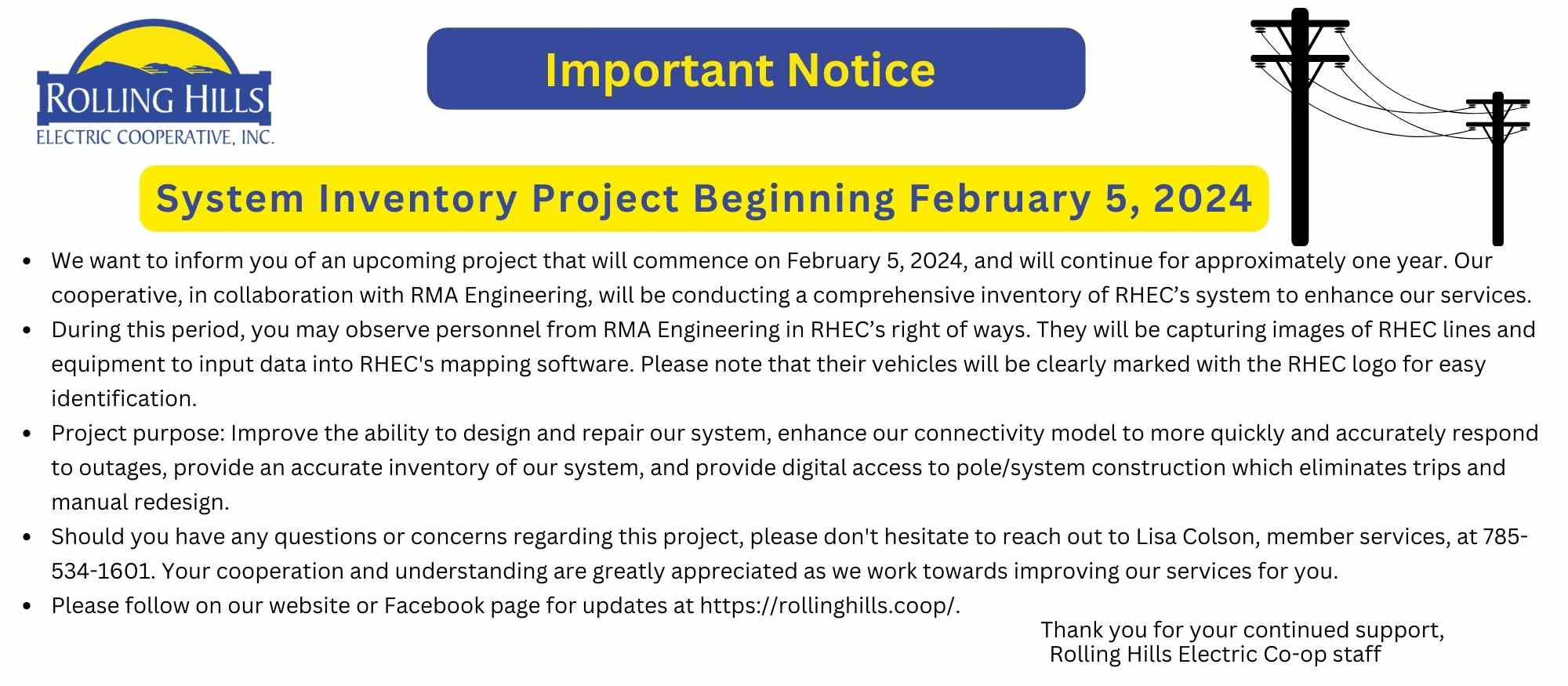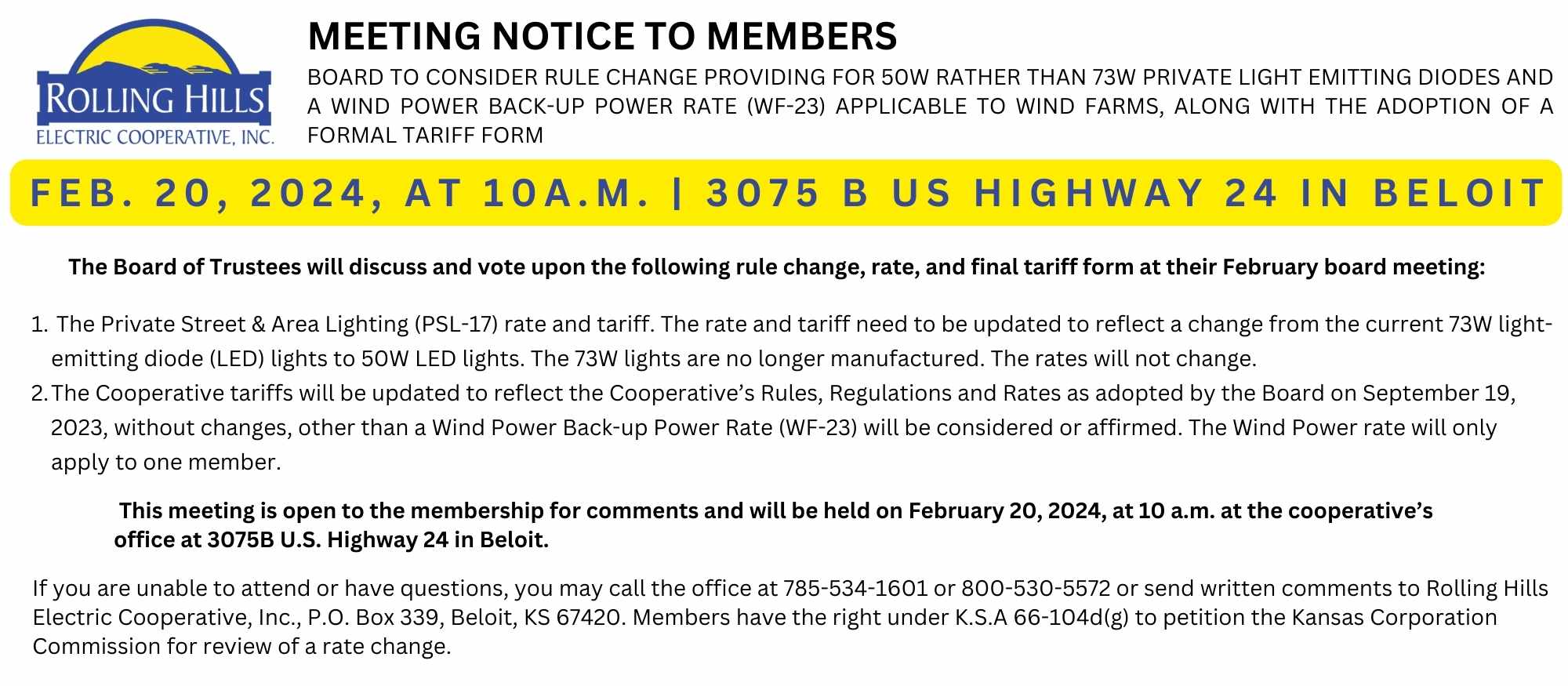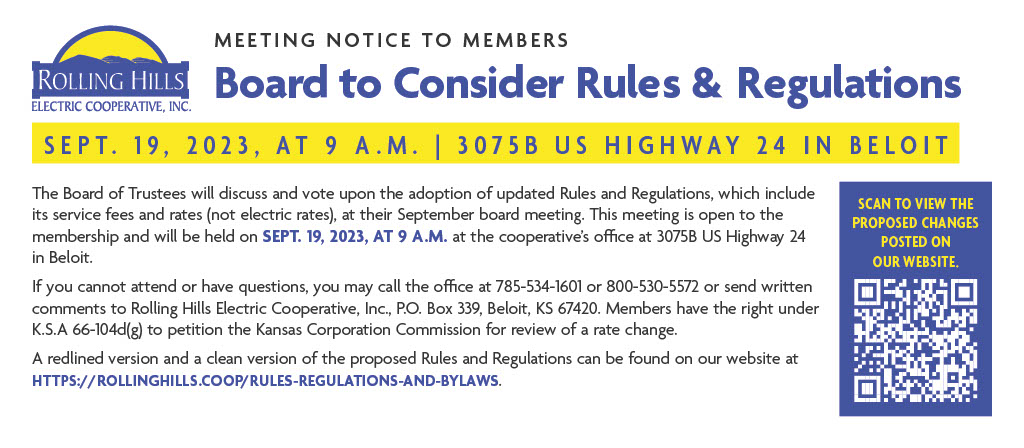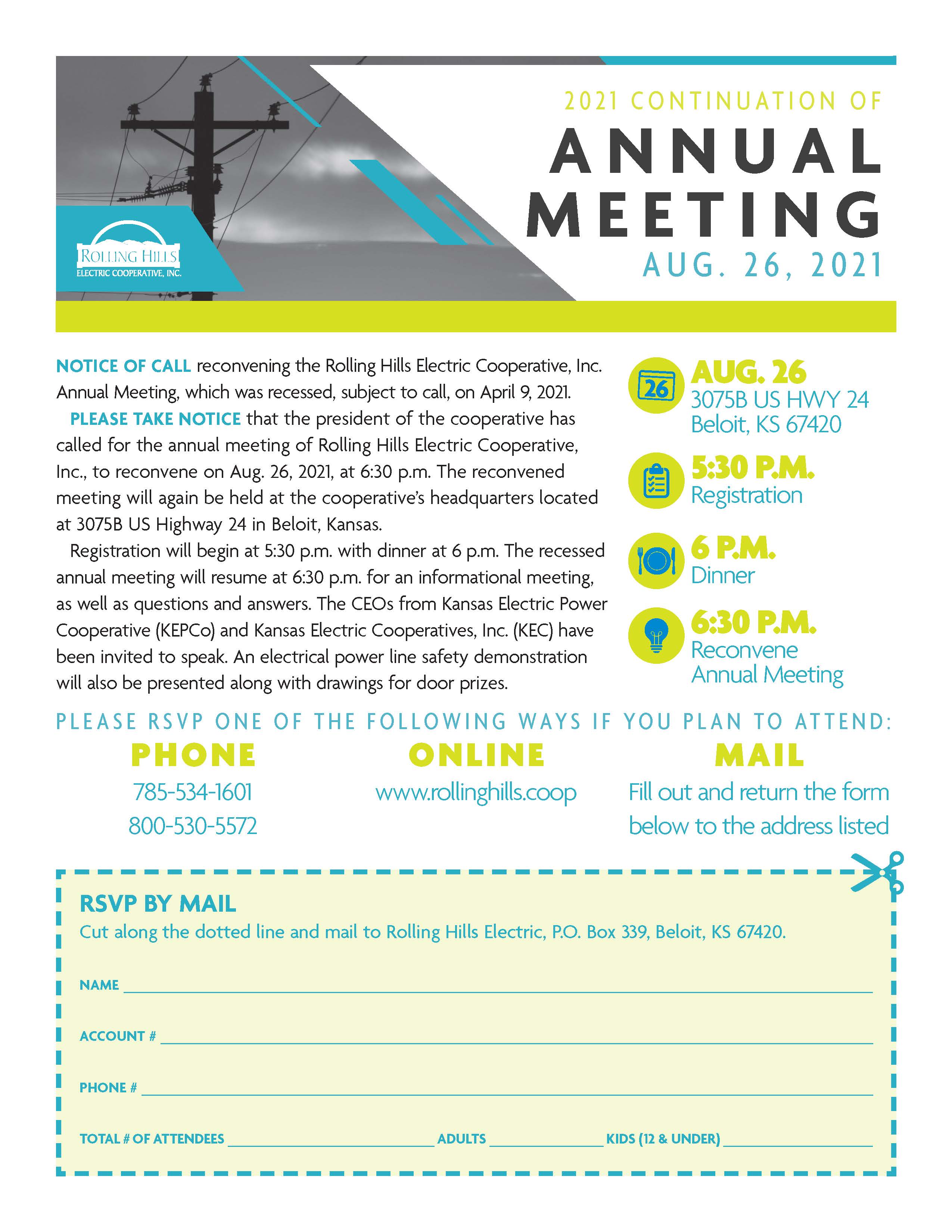













February Polar Vortex Weather Event Update
As of April 1, 2021
As promised in the communication sent to our members last month, Rolling Hills Electric has obtained new information regarding the February polar vortex weather event. Although the total cost impact is still unknown, and likely won’t be known for a number of months, a plan has been set in place by our power supplier, Kansas Electric Power Cooperative, Inc. (KEPCo), to amortize the costs attributable to the weather event over a 24-month period. The below information will hopefully help explain and answer some questions that our members may have.
How long will it take to know the final costs from the February polar vortex event?
- The Southwest Power Pool (SPP) requested and received an extension from the Federal Energy Regulatory Commission (FERC) to resolve and finalize the cost impacts.
- At this time, the final SPP review, settlement, and billing will not occur until approximately late fall. Even then, with state and federal regulatory agencies and lawmakers involved, the process could take longer to determine final, attributable costs.
Who is KEPCo (Rolling Hills Electric power supplier)?
- Rolling Hills Electric is a distribution electric cooperative, meaning we do not produce electricity but we distribute electricity that comes from our power supplier.
- Rolling Hills Electric’s power supplier is KEPCo (Kansas Electric Power Cooperative, Inc.).
- KEPCo is composed of 16 electric cooperatives in the state of Kansas.
- Rolling Hills Electric has a very active role in KEPCo:
- Doug Jackson, Rolling Hills General Manager, serves as KEPCo’s Board President.
- Paul Wilson, Rolling Hills Board Trustee, serves on the KEPCo Board of Trustees.
What are the advantages of Rolling Hills Electric being a member of KEPCo during this weather event?
As a member of KEPCo, their decision to amortize cost impacts from the polar vortex demonstrates the value of nearly all seven of the cooperative principles. Being self-governed, focused on community, economically responsible, and cooperating among our cooperative members to do the best we can to provide safe, economical, reliable power are valuable benefits of the cooperative model and never more so than now!
- KEPCo believes their members were more protected from market conditions than other utilities during the February weather event.
- Although no utility was completely protected, Rolling Hills’ relationship with KEPCo provided owned resources and capacity contracts that covered the vast majority of our energy needs.
- February energy costs paid by KEPCo for Rolling Hills Electric’s usage in February were nearly twice the budgeted billing for February, compared to other utilities in Kansas whose costs were much higher (6 – 12 times higher).
- Due to KEPCo’s cash position and access to low-cost financing, they can assist their member cooperatives by mitigating the cost of the extreme weather event over a 24-month period.
How will the February polar vortex costs continue to impact my future electric bills from Rolling Hills Electric?
In times of a crisis, such as the February polar vortex event we all experienced, the benefits of being a member of Rolling Hills Electric as well as a member of our power supplier, KEPCo, shows how valuable and fortunate we are for being a member of a cooperative who has protected our members from much of the price increases on energy.
- The good news is that KEPCo, our power supplier, believes that Rolling Hills Electric had limited exposure to the market during the February polar vortex event.
- The cost impact as of today to KEPCo, who supplies energy to nearly 300,000 Kansas members, is nearly twice the February budgeted expense for energy.
- The amount collected by KEPCo capping the power cost adjustment (PCA) was nearly 30% of the amortized value, leaving a current balance of approximately 70% of the amortized value yet to be collected.
- Realizing that there will be time before all of this will be settled, the KEPCo board elected to amortize the remaining 70% yet to be collected, plus any settlements, over the next 24 months.
- Amortizing the costs over a 24-month period will help mitigate the impact to the nearly 300,000 rural Kansans KEPCo’s member cooperatives serve.
- No interest will be accrued throughout the amortization period.
What does this mean to Rolling Hills members?
- KEPCo’s remaining amortized value from the February weather event is yet to be collected. This equates to approximately 70% of the cost impact through March 31.
- KEPCo will amortize 1/24 of this value for the usage incurred in March and billed in April.
- Because usage values for March are not finalized as of the time of this letter, the estimated factor that this value produced for the nearly 300,000 KEPCo members is approximately $0.00193 per kilowatt hour.
- For example, for an average residential Rolling Hills member using 1,000 kWh per billing cycle, the additional cost added to the PCA would have a less than $2 impact on the PCA billing line for the month of March.
- As additional costs are incurred or credits are applied, the amortization will be adjusted with plans to fully recover all the costs over the next 24 months.
What happens next?
- Many regulatory agencies have opened investigations into the polar vortex event.
- These entities include FERC, the North American Electric Reliability Corporation (NERC), Congress, the Kansas Corporation Commission (KCC), and the Kansas Legislature, which has not only been inquiring, but has already passed or is considering expedited legislation to assist utilities and customers across the state with the cost impacts of the weather event.
- Rolling Hills Electric will keep our members advised once we learn of the full impact from this event and will communicate to our membership.
Once again, we thank you, our members, for your understanding and patience during these unprecedented times. As always, please contact our office at 785-534-1601 if you have any questions. Thank you!

P.O. Box 339 | 3075B US Highway 24, Beloit, Kansas 67420 | 785.534.1601
March 1, 2021
As a Rolling Hills Electric Cooperative member, your best interest is always at the forefront of our operations. Over the past couple of weeks, there have been many discussions and meetings on the recent Polar Vortex phenomenon that occurred causing the rolling outages that some of our members experienced a couple of weeks ago. There is a lot of information being circulated and so we want to communicate to our members what you can expect to see on your bills in the coming months. The good news is that Rolling Hills believes that we were protected more so than other utilities because we had less exposure to the market during this time.
What Happened?
- A mid-February Polar Vortex outbreak caused historically low temperatures and ice/snow to grip many regions of the country, stressing both electric generating capacity and the ability of the transmission grid to move power from state to state and region to region.
- Emergency situations were quickly declared by the Southwest Power Pool (SPP) which forced many electric cooperatives into rolling outages due to the inability of electric generation supply to meet demand.
- Power generation by natural gas was an issue at this time due to the following main issues:
- Depletion of natural gas supply created high prices during a short timeframe.
- Some natural gas plants were not equipped to handle the extreme cold which left the supply frozen in the ground.
- During the extreme cold, renewable energy generators (e.g., wind generation) were not able to produce placing stress on the natural gas market that was tasked with making up for the energy shortage.
- Natural gas is the fuel of choice to replace renewables, which was already in short supply because people were using it to heat their own homes as well. This escalated demand and depleted supply causing the price for natural gas to drastically increase during this timeframe.
What is the Southwest Power Pool (SPP) and why is it important?
- The SPP oversees the bulk electric grid and manages the reliability for a 14-state region that includes Kansas.
- The SPP does not generate electricity, own power lines or substations, but rather is tasked with operating the power grid in a safe and reliable manner.
- The SPP handles many power transactions in any given timeframe. It will take the SPP up to 120 days to go through the transactions to determine final costs and even then, with regulatory agencies, state and federal politicians in the mix, the process could take longer to determine final cost.
- The SPP has never in its existence had to implement rolling blackouts and has never dealt with this extreme type of phenomenon.
Why was there no warning?
- The SPP declared and broadcasted that they had enacted an Energy Emergency Level 1 that began Sunday evening, February 14th, to ask all electric consumers to conserve energy.
- The record cold temperatures forced the electric industry to take extreme steps to prevent catastrophic damage to the power grid.
- Power is controlled at high voltage transmission lines, which Rolling Hills does not own. Our office was given no warning or notification of the rolling blackouts that were implemented until the moment the power went out.
- Grid operators, like the SPP, operate with a focus on the overall reliability of the electric grid. When demand exceeds supply, grid operators have the authority to mandate rolling blackouts like some of our members experienced a couple weeks ago.
What’s going to happen to my electric bill?
- ACTUAL USAGE COST: Your bill for February will more than likely be higher simply due to increased energy usage to heat homes during the extreme cold weather. The normal rates will apply for this usage.
- Space heating and water heating are the two biggest drivers of energy use in most households, accounting for over 50% of a home’s energy use during the winter months.
- POWER COST ADJUSTMENT: Our power supplier, KEPCo, determines this adjustment every month which is dependent upon the fluctuating costs of fuels. This is where our members will see the price adjustments for the energy emergency crisis. The good news is that through KEPCo, a cap has been set for the month of February usage to $0.033 per kilowatt hour used for the Power Cost Adjustment Factor.
- This adjustment will add approximately $0.016 to the typical PCA Factor that Rolling Hills has been charging. Last month the PCA Factor was a credit of ($0.0146). Because member demand and energy also affect the monthly cost of energy, it is difficult to predict an accurate PCA Factor at this time. It would be reasonable to assume that the PCA Factor for February may be in the $0.002 to $0.01 range.
What’s the good news?
- Rolling Hills resources (Wolf Creek, IATAN 2, Hydropower allocations and 20 Megawatt Diesel) generated at their best during the extreme weather situation.
- KEPCo’s contract with Evergy, which supplies a majority of the remaining energy needs, was also producing very well during this event. Although we feel we had a very small portion of our power supply exposed to the market during this crisis, we are still concerned about how the exorbitant natural gas prices will affect costs moving forward.
- Any increase in prices caused by this phenomenon has been capped on February’s billing (see power cost adjustment section above).
- Members’ bills should not be as high as some of the variable price spikes reported by some Texas customers of retail electric companies. Because of long-term, stable contracts between KEPCo, Evergy, and Rolling Hills, our situation is different than Texas. Texans’ rates are compounded due to the fact they are deregulated at the retail level, which means many consumers have chosen to pay wholesale prices for their power. This approach can be cheaper during good weather but spikes when there is a high demand for electricity, such as what occurred in February.
What happens next?
- It will take some time for the SPP to finalize all the costs associated with the February energy crisis. Rolling Hills will deal with the costs on a monthly basis and communicate with our members the cost effects from this February event.
What are my options for assistance to pay my electric bill?
Members are encouraged to contact our office to review payment assistance resources and discuss payment arrangement options.
- BUDGET BILLING is an available payment option to help keep monthly electric bills predictable and manageable. This free option averages electric use over a 12-month rolling period to avoid big fluctuations in monthly bills.
- LIEAP PROGRAM (Low Income Energy Assistance Program) is a is a Federally funded program that helps eligible households pay a portion of their home energy costs by providing a one-time per year benefit. Applications are due by March 31st, 2021. The link to apply can be found on our website at www.rollinghills.coop.
- SMART HUB is an online portal where members can pay their bill online as well as see their usage down to an hour timespan! Visit our website to sign up for an account at www.rollinghills.coop.
Most importantly, we want to thank you, our members, for your patience and understanding during this unprecedented time. You all did your part to help keep us from more controlled rolling outages while Mother Nature wreaked havoc on us all. We have outstanding communities and members we serve. As always, please contact our office at 785-534-1601 if you have any questions. Thank you!
Download this information as a PDF

